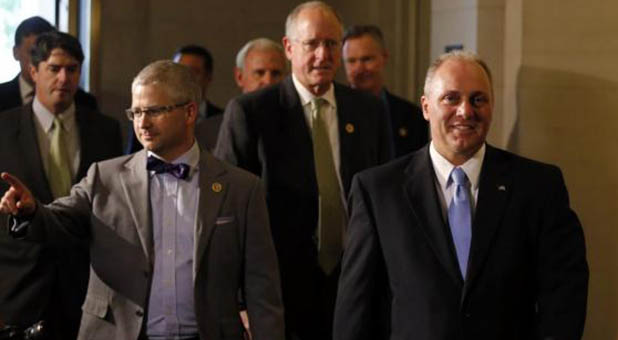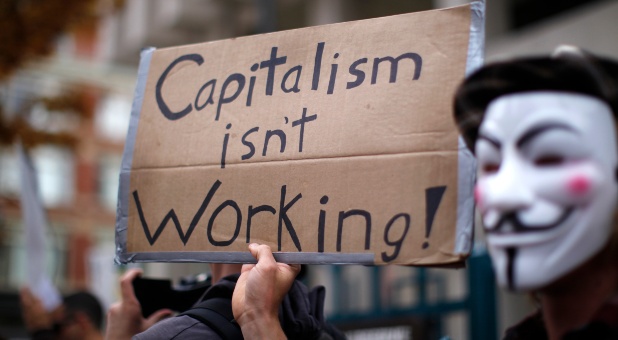Evangelical Christians now have a new issue to discuss with their elected representatives in Washington, D.C., when they return to their home states this weekend for the final five-week push to the Nov. 8 election.
The American Revolution was a direct byproduct of the First Great Awakening in America; the abolitionist movement was a direct byproduct of the second. In both cases, the “Black-Robed Regiment”—America’s pastors—led the charge.
If there is to be a Third Great Awakening, however, the nation’s pulpits need to be unshackled from the Johnson Amendment—an addition to the U.S. tax code named for its author, President Lyndon Johnson, that prevents churches and other 501(c)(3) nonprofits from engaging in overt political activity. Churches are prohibited from engaging in political activity, severely limiting what pastors can and cannot say or do.
Republican presidential nominee Donald Trump recognized this issue and has made it a major theme of his campaign. And now, a member of the House Republican leadership has joined in that fight.
House Majority Whip Steve Scalise (R-La.) and U.S. Rep. Jody Hice (R-Ga.) introduced the Free Speech Fairness Act to coincide with this Sunday’s Pulpit Freedom Sunday. The bill would allow 501(c)(3) nonprofits to engage in political activity—including endorsing candidates and ballot measures—if it is done at no cost and the activities fit with the church or organization’s regular activities.
In other words, a pastor could speak about politics freely from the pulpit without threat of punishment from the IRS for the first time in more than 60 years.
“For decades now, the Johnson Amendment has limited the ability for a lot of churches and religious organizations and nonprofits to express their views and to exercise their free speech rights and exercise the religious liberty that is one of the hallmarks of our Constitution,” Scalise said during a Wednesday press conference announcing the bill. “Under president Obama, the IRS formed a committee to aggressively go after churches and other religious organizations using the Johnson Amendment of 1954 to limit their free speech. Since then, we have identified 99 cases already where churches have been flagged for potential violations of the law. And, the federal government, through the IRS, is now going after churches.”
Hice, an ordained Southern Baptist pastor, knows firsthand how the Johnson Amendment forces other pastors to “self-censor” their sermons and speeches to stay in the IRS’s good graces. This has had a dramatic effect on the entire country, he added.
“That is what has taken place,” he said. “Every election cycle, I would receive letters and great threats and intimidations about how we could be facing a potential lawsuit or removal of our tax-exempt status. Just about every church receives those kinds of letters every election cycle.”
Tony Perkins, President of the Family Research Council, joined Scalise at the press conference, and added his support for the bill. He said the bill shouldn’t be difficult to pass because it prevents nonprofits from becoming “political operatives or fronts for political operations” by turning their tax-exempt funds into political contributions.
“You can make a statement. You can make an endorsement, but you cannot be a front for political operation, meaning that you turn tax-exempt money into political funds,” he said. “Expenditures are restricted in terms of you can’t go beyond what would be your normal course but your free speech rights are restored. As a nonprofit or a church, you can speak to the issues.”
The FRC are mobilizing its members to encourage their members of Congress to adopt the bill. In an email sent out after the press conference Wednesday afternoon, Perkins wrote in the spirit of Ephesians 6:13:
Every election cycle makes one thing abundantly clear: the Johnson Amendment is chilling the speech of churches, tax-exempt organizations and their leaders. The Johnson Amendment was introduced by Lyndon Johnson in 1954, after he was elected to the Senate despite a tax-exempt organization urging his defeat. This amendment was passed without any debate and was hidden in a larger tax package. The Johnson Amendment prohibits tax-exempt organizations from participating in, or intervening in, any political campaign on behalf of or in opposition to any candidate for public office.
The IRS enforces the Johnson Amendment, but has been inconsistent in its application of the law. It has imposed fines and penalties against exempt organizations only to later refund the fines. The IRS has even neglected to provide guidelines to help tax-exempt organizations better understand when they would run afoul of the Johnson Amendment. Because of the inconsistent approach in enforcing the Johnson Amendment, it has had the unconstitutional effect of chilling speech, particularly the speech of pastors.
That is why one Sunday a year—Pulpit Freedom Sunday—pastors across the country preach directly and scripturally about candidates and encourage their church members to exercise their stewardship responsibility to be salt and light in the election process. This year, Pulpit Freedom Sunday is October 2.
Though Pulpit Freedom Sunday events have been occurring for about a decade, none of the churches that have participated have had their tax-exempt status revoked. One goal of the effort has been to attract a lawsuit where the constitutionality of the Johnson Amendment could be challenged in court. However, the IRS has not revoked the tax-exempt status of any of these churches. Despite the IRS’s inconsistent enforcement, hostile anti-religious freedom organizations send letters threatening churches with the Johnson Amendment claiming if they engage in any political speech, they will lose their tax-exempt status. Therefore, we need Congress to act.
The good news is Majority Whip Steve Scalise (R-La.) and Representative Jody Hice (R-Ga.) have introduced the Free Speech Fairness Act of 2016 (H.R. 6195) to restore the First Amendment free speech rights of pastors and tax-exempt organization leaders. The Free Speech Fairness Act would allow tax-exempt organizations to engage in political activity so long as it is essentially cost-free, and is made in the ordinary course of the tax-exempt organization’s regular activities. Basically, the Free Speech Fairness Act allows tax-exempt organizations to discuss political issues without allowing them to buy political campaign ads, and is a desperately needed fix for the unconstitutional Johnson Amendment. This is where we need your help. Please contact your Congressman, and urge him or her to co-sponsor the Free Speech Fairness Act of 2016 to protect the rights and freedoms of churches, charities and their leaders.
FRC Action has created a website that will help you send a form letter directly to your elected representatives. It encourages them to support the legislation.
See an error in this article?
To contact us or to submit an article






















